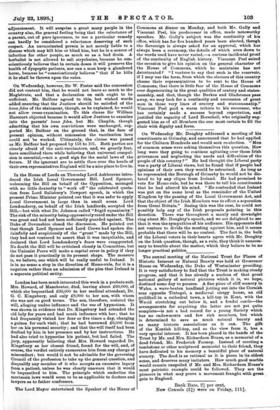London has been much interested this week in a probate
suit. Mrs. Howard, of Manchester, died, leaving about 290,000, of which she bequeathed £30,000 to her medical attendant, Dr, G. C. Kingsbury, and only 28,000 to her son, with whom she was not on good terms. The son, therefore, resisted the will, alleging undue influence and the use of hypnotism. It was shown in evidence that Dr. Kingsbury had attended the -old lady for years and had much influence with her; that he had frequently visited her four or five times a day, charging a guinea for each visit ; that he had borrowed 26,000 from her on his personal security ; and that the will itself had been drafted by him in her presence and by her instructions. He had also tried to hypnotise his patient, but had failed. The jury, apparently believing that Mrs. Howard regarded Dr. Kingsbury as her closest friend, found for the will, and, of course, the verdict entirely exonerates him from any charge of misconduct ; but would it not be advisable for the governing Council of the profession to take up the general question, and disqualify any member of it who accepts an excessive legacy from a patient, unless he was clearly unaware that it would be bequeathed to him. The principle which underlies the mortmain laws would seem to be as applicable to doctors and lawyers as to father confessors.


































 Previous page
Previous page